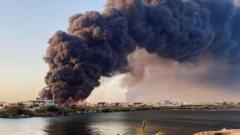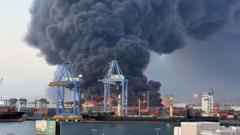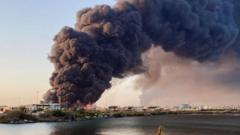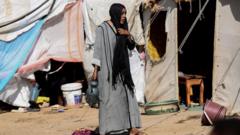Doctors Without Borders reported that seven individuals were killed and 20 injured after a bombing at a local hospital and market in South Sudan. The attack raised concerns of renewed civil war amid escalating political tensions between government leaders.
Tragic Bombing in South Sudan Leaves Seven Dead and Sparks Civil War Fears

Tragic Bombing in South Sudan Leaves Seven Dead and Sparks Civil War Fears
A hospital and market in Old Fangak, Jonglei state, were bombed, leading to multiple casualties and increasing tensions over a potential return to civil conflict in South Sudan.
At least seven people lost their lives in South Sudan following a devastating bombing that struck a hospital and nearby market, according to the humanitarian organization Doctors Without Borders (MSF). The bombing occurred in Old Fangak, Jonglei state, where helicopter gunships reportedly targeted the charity's hospital pharmacy, completely destroying it, before continuing to engage the town for approximately 30 minutes. Subsequently, a drone strike hit the local market.
This hospital served as the only medical facility in Fangak county, which accommodates over 110,000 residents, meaning the loss of its supplies is particularly dire. MSF characterized the bombing as a "clear violation of international humanitarian law" and expressed deep concern over the escalating violence.
Recently, Nicholas Haysom, the head of the UN mission in South Sudan, cautioned that the nation is on the verge of a return to full-scale civil war. Tensions have intensified due to a power struggle between President Salva Kiir and Vice-President Riek Machar. Just hours before the bombing, army chief Paul Majok Nang had threatened reprisals after several barges were reportedly hijacked, linking the incident to a militia associated with Machar—who has not publicly responded.
Machar and several of his supporters were arrested in March on allegations of inciting a rebellion. Following this unrest, the government identified certain counties as hostile, signaling possible ulterior motives tied to Machar and his alliances.
South Sudan attained independence from Sudan in 2011, only to descend into civil war two years later after Kiir accused Machar of an attempted coup. The ethnic tensions between the two leaders' factions led to approximately 400,000 deaths and over 2.5 million displaced individuals during the conflict. Although a peace agreement was established in 2018, intended to unify the military and end militia affiliations, the situation remains precarious, with numerous armed groups still loyal to different political figures.
The current turmoil flared earlier this year when the White Army militia, previously allied with Machar, engaged in hostilities with the government forces, culminating in clashes in Upper Nile state. The situation worsened in March when a UN helicopter was attacked while attempting troop evacuations, resulting in fatalities.
In light of these recent attacks, human rights organizations are urging the military to cease bombings in civilian areas, emphasizing the need for de-escalation and dialogue to prevent further loss of life.




















